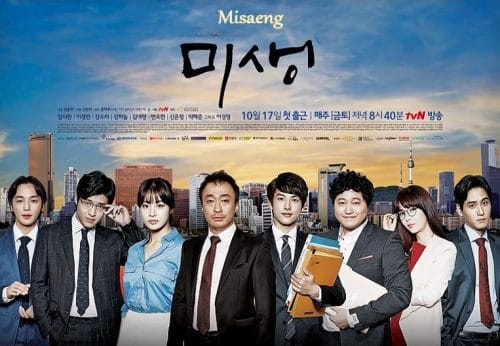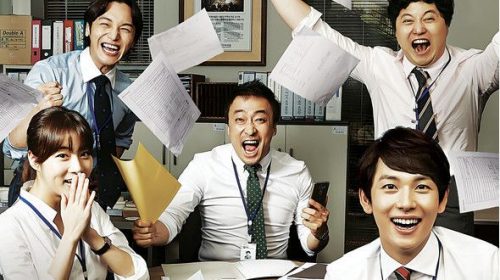K-drama review: Misaeng

This TV show is a little hard to categorise, but I guess I’d plump for…office drama? It’s quite serious and low-key, and apparently won lots of awards when it first aired (tvN 2014). Misaeng is sometimes listed with its subtitle (and translation) “An incomplete life”, which gives quite a good indication of its overall tone.
As we learn early on, Misaeng is a term from the board game Go (or Baduk in Korean), which is relevant because the show’s main character Jang Geu-rae (played by Im Si-wan) is a former professional Go player. He wasn’t able to earn enough money to live on from playing Go, so he has given it up and is now taking any job he can get without a degree. When a rare opportunity for a proper office job comes along he takes it, even if it is an internship for something he has never particularly wanted to do: sales.
At this company – One International – rumours run rife, which means that everyone immediately knows that Geu-rae didn’t go to university and was recommended for the position by someone senior. He also has no office experience and doesn’t speak any foreign languages. This does not go down well with his fellow interns or with his new manager, Oh Sang-sik (Lee Sung-min). Manager Oh is brusque and loud, but turns out to be honest to the point of pissing off many people around him, which means he is actually a good match for eager, innocent Geu-rae.
One International has taken on dozens of interns but usually only two or three will be offered permanent positions, so they are set a series of tasks to be assessed on. Through this we not only watch Geu-rae learning the basics of the job, but also get to know some of his fellow interns. An Young-yi (Kang So-ra) is the first we meet – she is super capable and managers are already fighting over which of their teams she will be assigned to when she gets the job. Then there’s Jang Baek-gi (Kang Ha-neul, from When the Camellia Blooms) who is capable, anxious, but also smug and snobbish. And Han Seok-yul (Byun Yo-han) seems to be obnoxious and sexist, possibly rooted in the fact that he is from a long line of factory workers who both look up to and resent “head office”.
The opening scene of the series gives, I would argue, a false impression. It is a high-octane chase sequence through Amman in Jordan. It is jarring to then skip to Geu-rae’s slow-paced internship story, and even more so when that energy is not again evident until the final episode of the series, when the prologue’s relevance is finally revealed. And that isn’t the only tone shift. The early parts of Geu-rae’s story have a touch of comedy, albeit comedy with sad overtones – such as him wearing his dead father’s suit that doesn’t fit him. But there is then a long section of the series that is just slow and sad, essentially covering all the ways in which work can be tough, from bullying and harassment, to long hours and difficult clients, to personal clashes between colleagues.

I did appreciate that although there aren’t many female characters in this series, the storylines cover several different aspects of gender-based harassment, from sexual comments and advances, to unequal expectations around parenting, to outright sexist assumptions that women can’t do the same work as well as men can. I also like that there are multiple male-female friendships that do not have any hint of romance. (There are also a couple of minor romantic storylines, but they are very much in the background.) And we get to know a few of the managers and the troubles in their lives, not just the youngsters.
Overall, I found this a bit too slow, and I wasn’t gripped, but it is very well acted and, when viewed as a whole, quite a brutal attack on corporate culture. It does suffer, especially later on, from far too many flashbacks, sometimes replaying a scene immediately afterwards. No wonder the episodes are 75 minutes long! I found Geu-rae bland, which I would guess is partly deliberate – he is the viewer’s eyes into the unknown – and I suppose at least for once it was a male character who was meek and subservient for fear of losing his job.
I did appreciate learning that Korea does produce some TV shows that are not romantic melodramas, but I will be returning to the melodramas for my next K-drama hit.